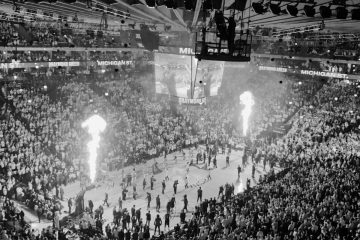What Happened On July 31st?
On July 31, 2012, Michael Phelps broke the record for the most Olympic medals won by an individual. This milestone occurred during the London Summer Olympics, where Phelps secured his 19th medal, surpassing the previous record held by Soviet gymnast Larisa Latynina since 1964.
Michael Phelps made history in the 4×200-meter freestyle relay. Swimming the final leg, he secured a gold medal finish with a time of 6:59.70. This victory earned him his 19th Olympic medal. Earlier that day, Phelps competed in the 200-meter butterfly and earned a silver medal, narrowly beaten by South Africa’s Chad le Clos. Phelps wore two caps during his races to reduce drag and keep his goggles in place.
The Aquatics Centre buzzed with anticipation. Spectators knew they were about to witness a historic moment. Phelps’s teammates, Ryan Lochte, Conor Dwyer, and Ricky Berens, delivered strong performances, setting Phelps up for his record-breaking swim. As Phelps touched the wall, the arena erupted in cheers, and his teammates leaped into the pool to celebrate.
The Roots Of A Champion
Michael Phelps, born in Baltimore, Maryland, in 1985, began swimming at seven. His early training under coach Bob Bowman set the stage for his success. He made his Olympic debut at 15 during the 2000 Sydney Olympics, finishing fifth in the 200-meter butterfly.
Phelps struggled with ADHD as a child, and swimming provided an outlet for his energy. His commitment to the sport and Bowman’s guidance helped him channel his focus and determination.
Strokes Of Brilliance – Athens 2004
Phelps broke through at the 2004 Athens Olympics. There, he won six gold and two bronze medals, almost matching the record for the most gold medals won in a single Olympics, set by Mark Spitz in 1972.
Phelps’s intense training, often involving swimming long distances each week, and his dedication to perfecting his technique drove him to success. He followed an eight to ten thousand-calorie diet daily during peak training, consuming large amounts of pasta, pizza, and energy drinks to fuel his intense workouts.
Phelps’s training also included resistance exercises in the water, building strength and endurance. His underwater dolphin kick, perfected with Bowman’s help, became one of his most powerful tools in the pool.
Beijing’s Eight Wonders
By 2008, Phelps’s dominance was clear. He won eight gold medals at the Beijing Olympics, setting a new record for the most golds in a single Olympics. His performance in Beijing included memorable races, such as the 4×100-meter freestyle relay, where Jason Lezak’s final leg secured a win by 0.08 seconds.
Phelps’s mental preparation also played a crucial role. He used visualization techniques before each race, mentally rehearsing his performance to ensure readiness.

London Calling
As the 2012 London Olympics approached, Phelps faced immense pressure to maintain his dominance. He had already made history at the 2008 Beijing Olympics, winning eight gold medals and breaking Spitz’s record. In London, Phelps did not want to compete.
Phelps trained with unmatched intensity, adhering to a strict schedule of daily workouts, weightlifting, and a high-calorie diet. He included mental conditioning, using visualization techniques for each race. He focused on recovery, using ice baths and massage therapy to keep his body in top shape.
Phelps’s dedication extended beyond the pool. He studied his competitors‘ techniques and strategies, often watching videos of their races to identify strengths and weaknesses. This meticulous approach helped him stay ahead in a highly competitive field.
Rising Above The Waves
Phelps faced significant challenges on his journey to breaking the record. In the 400-meter individual medley, he finished fourth, missing the podium for the first time since his Olympic debut. Despite this setback, Phelps stayed focused and determined.
In the 200-meter individual medley, Phelps competed against teammate Ryan Lochte. Phelps won the race with a time of 1:54.27, securing his first gold medal in London and becoming the first male swimmer to win the same event in three consecutive Olympics. This race showcased Phelps’s versatility, as he excelled in all four strokes: butterfly, backstroke, breaststroke, and freestyle.
The Butterfly Effect
Another key moment came in the 100-meter butterfly. Phelps claimed gold with a time of 51.21 seconds, marking his third consecutive Olympic gold in the event. His unique body structure, including an arm span longer than his height and size 14 feet, contributed to his unmatched performance in the water.
Phelps’s ability to remain calm under pressure and his focus on technique over raw power often gave him an edge over competitors. His dolphin kick, used off the walls in every turn, provided a powerful advantage that many swimmers struggled to match.
The Waves Of Influence
Phelps played a vital role in the U.S. team’s success, mentoring younger swimmers and providing leadership in high-pressure situations. His influence helped the team secure multiple medals, highlighting his impact both in and out of the pool.
Phelps’s contributions to the sport went beyond his swimming achievements. He advocated for water safety and swimming education, founding the Michael Phelps Foundation to promote healthy lifestyles and the sport of swimming.
During his career, Phelps broke 39 world records, the most ever by a swimmer. Beyond his physical abilities, Phelps’s mental resilience and strategic thinking set him apart from his competitors.
Phelps’s post-swimming career included efforts to support mental health awareness. He openly discussed his struggles with depression and anxiety, working to destigmatize mental health issues among athletes and the public.





